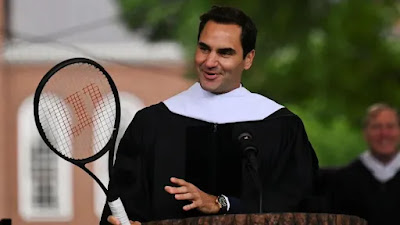I have long believed that I could include a lesson or example from tennis into Sports and Spirituality every single day. Though many of my students do not play or watch the sport, I'm convinced it is a poignant, fitting and sometimes the superior analog. Tennis is physical and mental, offense and defense, singles and doubles, male and female. Tennis is forehand and backhand, serve and volley, baseline and net. Its language is unique—let and love, ace and deuce. Tennis is private and elite—and yet it is accessible, increasingly diverse and global. The greats of the game are some of our country's heroes: Arthur Ashe, Billie Jean King, and the Williams Sisters. And this graduation season, Roger Federer emerged as one of tennis' great teachers with his Commencement Address at Dartmouth University.
Beginning his professional tennis career at 16, Federer did not attend college. He said receiving a Doctor of Humane Letters degree from Dartmouth was his “most unexpected victory ever.” Still, King Fed served as an ideal speaker because like the graduates, he has recently undergone a time of transition. In his speech he said,So I never went to college... but I did graduate recently.
I graduated tennis.
I know the word is “retire.” “Roger Federer retired from tennis.” Retired... The word is awful.
You wouldn’t say you retired from college, right? Sounds terrible.
Like you, I’ve finished one big thing and I’m moving on to the next.
Like you, I’m figuring out what that is.
No, in truth, I’m loving the life of a tennis graduate. I graduated tennis in 2022, and you are graduating college in 2024. So I have a head start in answering the question of what’s next.
Today, I want to share a few lessons I’ve relied on through this transition.
Let’s call them… tennis lessons.
In September 2022, Roger Federer retired from professional tennis. He was 41 years of age (at the time). the Swiss athlete's lessons are practical and wise. Like tennis they are physical and mental, offense and defense, singles and doubles, male and female. I urge you to watch or read it for yourself. They are:
- Effortless’ is a myth.
- It’s only a point.
- Life is bigger than the court.
Personally, I found point number two to be singular. His examples are fascinating and speak to the breadth and depth of his career. Anyone can heed this advice. I know I need to do so.
Knowing how few of my own students know about Federer's career or play tennis, it's okay to ask Was his message lost on the graduates? And Is it spiritual?I'll let the Big Green Class of 2024 answer for themselves. I do however find it spiritual. Here's why. In the post "Try Story," Vinita Hampton writes
St. Ignatius understood that our lives are in motion, that we are living stories. A great deal of our spiritual health lies in our ability to see the story-ness of our existence. And not only do we learn to see our lives as meaningful sequences of events, and ourselves as the main characters who become transformed, but we learn to recognize another major character in our lifelong story. God has always been in our story, and as our eyes are opened and we see where God’s love, peace, power, wisdom, and grace intersected our personal sequence of events, we begin to embrace our lives as sacred story—lovely, grace-filled story.
To me Federer's lesson from tennis amount to a great story. He cites numerous characters and events, motion and drama. We gain a sense of his hopes and his humanity. What and who he loves—his wife and family, his agent who has become his friend—and connection to Dartmouth. Federer's story is a living one and like the graduates, there is much more to be written. Lucky for us, I don't doubt that in some capacity we will get the chance to read new chapters in the years to come.
Roger Federer, you even made this speech look effortless. Thank you for contributing to the cannon that is Sports and Spirituality.
Racket


No comments:
Post a Comment